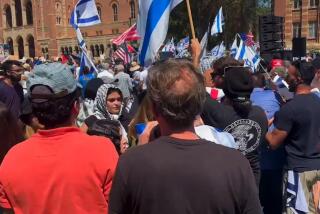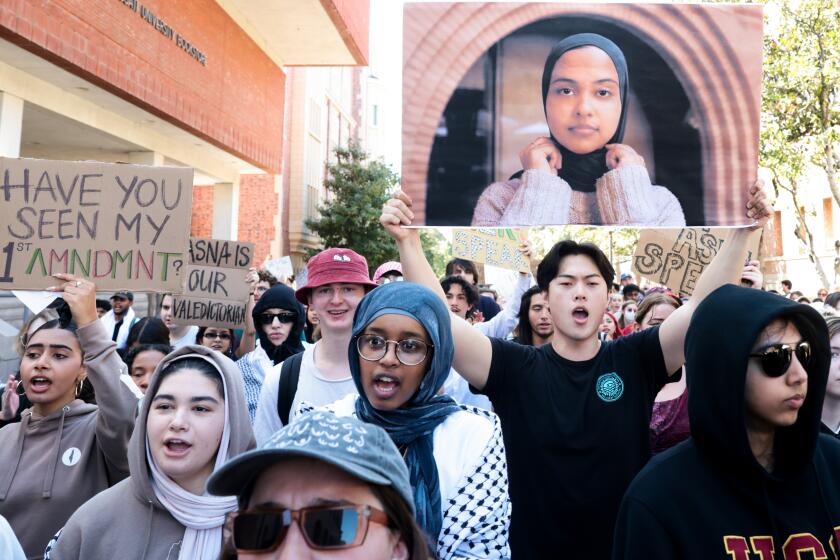Food Is Served Sans Sermons on the Side : Couple’s Self-Endowed Center for Poor Religiously Follows a No-Preach Policy
“I live nowhere, I eat here.”
--Johnny Maiden, South-Central
Los Angeles street person.
Glenn and Sandra Swain practice what they don’t preach--simple, straight-forward charity.
They feed the hungry and house the homeless.
Since 1978, they calculate they’ve distributed about 30 million pounds of free groceries to people in South-Central Los Angeles. And in the 18 months since they established their Community Kitchen at 77th and Hoover streets, they’ve served more than 75,000 free hot meals to men and women who might otherwise have dined on scraps scavenged from garbage cans or stolen from markets.
At any given moment, the Swains also provide no-cost shelter in their nearby eight-unit apartment house for 10 to 35 people whose alternative might be camping out in vacant-lot “cardboard condos,” parked cars or abandoned houses.
Meals for Tent City
And, as if these efforts weren’t enough, the Swains recently took on the additional chore of cooking 600 to 900 hot meals daily for the homeless people who were living in Tent City II in downtown Los Angeles.
All this is a low-key family affair organized and largely paid for by a couple who commute 55 miles from their home in middle-class Rancho Cucamonga to the mean streets of inner city Los Angeles.
Oddly, the Swains’ grass-roots charitable enterprises got started with what they had hoped would be profitable enterprises--a ladies boutique and the apartment house, which they thought would bring in about $5,000 a month.
Glenn Swain, a supervising tree surgeon for the Department of Water and Power, opened the boutique as a sideline in 1976. It had plenty of customers, according to Sandra Swain, and little wonder.
“I found out that Glenn was buying clothes and selling them at 25 cents over wholesale cost,” she recalled. “In fact, he was really giving them away, because when I checked the records, I found out he had between $5,000 and $7,000 in credit that never would be paid.”
Instant Clothing
Grinning, Glenn interrupted: “She says I gave away clothes! I recall once a lady came in the store with no clothes on--she was being chased down the street by somebody. And when the lady finally left, she had more clothes than she could carry.”
It was in December, 1977, after the third burglary of the store, that the couple decided the location was better suited to social work than a small business.
“People were always coming here with their problems anyway,” Sandra explained. “You know, ‘I can’t buy clothes because I don’t have enough for food, I can’t pay my rent.’ We realized that in such a heavy crime area you can’t have a business, and kids were always congregating here, and people were asking advice on where they could get help, so we finally realized what we had was a community center.”
So they closed the boutique and opened the modest two-story building at Figueroa and 77th streets as a kind of ad hoc private social service agency. Then, a year later, Glenn read a story that the government was dumping surplus cheese into the ocean off San Francisco because “it was cheaper to dump it than to ship it down here.”
An Air Force veteran and a long-time member of the California Air National Guard, Glenn knew there were people in South-Central Los Angeles who would welcome free cheese. He contacted his commanding general, and county Supervisor Kenneth Hahn.
“They kind of negotiated with the military to transport the cheese to Southern California,” said Glenn, a soft-spoken but passionately persuasive man. “Once they started doing that, they needed distribution sites. And since I was somewhat instrumental in all this, our place became one of the first distribution sites. We got 5,000 pounds of cheese in five-pound blocks, and from that time on, this was a very popular place.”
The boutique-cum-cheesery quickly evolved into a mass food distribution operation. Each Saturday, the Swains, members of their family and neighborhood volunteers handed out about 3,000 30-pound bags of free food. Initially, almost all the food came from the Long Beach Food Bank, which handles government surplus foods and foods donated by growers and markets. Later the Swains learned of and utilized other sources, such as Love is Feeding Everyone (LIFE), which also operates food banks.
By 1983, the Swains had incorporated Concerned Citizens for Community Improvement as a nonprofit corporation in order to meet all the reporting and other requirements of the city, state and federal governments.
They also had started a smaller-scale food and shelter program in Rancho Cucamonga and expanded their operation in South-Central Los Angeles to include a summer youth jobs project, food and counseling for children before and after school and nutrition classes for housewives. In 1985, with the help of Assemblywoman Maxine Waters (D-Los Angeles), they sent 40 ghetto youngsters to Morristown College in Tennessee, Glenn Swain’s alma mater.
Change in Approach
Although the mass distribution of free food remained the principal mission of CCCI until 1984, the Swains knew that a different approach was needed.
“All this time,” Swain said, “I realized that many people would get a bag of groceries--30 pounds of cheese, butter, flour, milk, rice, beans, honey--and they didn’t use any of it except what they could consume right away. We could walk down the street behind them and see that some of them might eat half the cheese, and throw the rest away--or they would go someplace and sell it.
“We began to realize we were dealing with many homeless people who didn’t even have a kitchen--no place to prepare food. And so we decided to expand what we were doing; we needed a kitchen where we could provide at least one hot meal a day.”
For a time, the small kitchen in the apartment above the CCCI’s headquarters was used to prepare a limited number of meals for the homeless, but they knew it was inadequate.
Glenn Swain found what he thought was the ideal spot for the hot food operation he had in mind--a vacant cafe in a small business complex at 77th and Hoover streets. Akira Kawasaki owned the complex, which included a grocery-liquor store and a coin laundry.
A Year of Persuasion
“It took me a year to convince him,” Glenn recalled. “He really didn’t believe that I wanted to put in a place that served free food. But I kept going back and going back and finally when he realized that it really was going to be a free kitchen, he not only let me have it rent free but he also bought me an $800 commercial stove to cook on.”
The Community Kitchen has been serving 150 to 200 people a day ever since. On special occasions, such as Thanksgiving and Christmas, the kitchen serves as many as 1,000. And during the last holiday season, the same kitchen turned out an extra 600 to 900 meals daily and trucked them downtown to Tent City.
“He had been feeding people in his community for years before homelessness became a popular issue . . . if it wasn’t for Glenn Swain and his Community Kitchen, we could not have done what we did here,” said Ted Hayes, who organized the tent compound. Their efforts have also been commended by Rep. Augustus F. Hawkins (D-Los Angeles).
Meantime, the Swains’ apartment house had become a free shelter for parolees and homeless people. At one time, because they receive no public funding for the shelter, the Swains owed the Department of Water and Power $10,000 for water. Glenn’s aunt, Lillian Harris, contributed her life savings to pay the bill and save the apartment house.
Family in Action
The Swains themselves put about $2,000 a month, not to mention uncounted hours, into their charity operations. In addition, Sandra Swain’s parents, Mr. and Mrs. Arcy B. Siglar, her brother, Fred Siglar, and her aunt, Levira Pickett, have pumped a total of about $35,000 into CCCI. Her sister, Violet Smith, who still gives much of her time to CCCI, runs a similar program in Compton called Nutritional Aid Shelter Assistance Program, a spinoff of the Swains’ organization. The CCCI’s staff of 10 to 25 people are, like the Swains, strictly volunteers.
According to Sandra Swain, the only public help CCCI has received is $22,500 in Federal Emergency Management Agency funds for food and shelter.
Much of the food and some funds are donated privately. Paul Olsen, a former neighbor and a Rancho Cucamonga meat wholesaler, has given thousands of pounds of meat; Knudsen’s Dairy gave 700 pounds of ice-cream for Christmas; David Yudovin, a Los Angeles seafood broker, donates 50 pounds of fresh fish each week and delivered 2,000 pounds of turkey last Christmas; Beverly Hills attorney Stanley Arouty contributed $2,000 in cash and, with his 8-year-old son, helped out with kitchen chores last Thanksgiving.
But what makes it all work is the team of Glenn and Sandra Swain, who have been married 14 years. She is a native of Watts, he was born in Gadsen, Ala., and both were raised by parents of modest circumstance. They have two daughters, ages 8 and 13, and Glenn has a 21-year-old son by a previous marriage. They’ve lived in Cucamonga for the last eight years after moving from Compton.
And what makes the team work so hard--16-hour days are the norm--for people they don’t even know? Both are deeply religious, but they don’t wear their religion on their sleeves.
“The reason we do what we do,” Glenn said, “is that anytime you help the sick, feed the poor, provide shelter for the needy, then you are doing God’s work. But we never preach to anyone who comes here for help. There are lots of people who come here who need to be preached to--and there are times when we need to be preached to. But, no, we never preach to anyone.”
More to Read
Start your day right
Sign up for Essential California for news, features and recommendations from the L.A. Times and beyond in your inbox six days a week.
You may occasionally receive promotional content from the Los Angeles Times.






